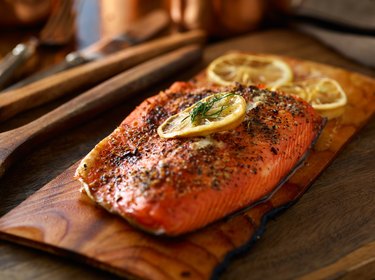
When it comes to finding the best weight-loss diet, there's no one-size-fits-all approach. That's why programs that promise personalization to your unique body, like the Hormone Diet, can seem so tempting.
But is there any real science behind this eating approach, and can it actually help you lose weight?
Video of the Day
Video of the Day
Here, we'll dig into how this trendy diet works so you can decide whether it's truly worth your time.
So, What Is the Hormone Diet?
Hormone diets in general are based on the premise that your hormones are "off," and switching up your eating style can help you function better and potentially lose weight. The concept is most well-known from the book The Hormone Diet, by Natasha Turner, ND.
The fix, according to this book, is to change your eating habits, which will alter your hormones, "reset" your body and resolve your weight issues.
This idea isn't entirely wrong — your diet is often the reason you aren't losing the weight you want, per the Mayo Clinic. But only a trip to the doctor and some blood tests can confirm if there is truly something wrong with your hormone levels, according to the Cleveland Clinic. And even then, it still might not be clear if your hormones had to do with weight gain.
The principles behind the hormone diet are not new, however. They include cutting out junk food and encouraging eating nutritious whole foods, per the book.
But the diet does nix foods that have not been shown to have any specific, direct effect on hormone regulation, such as gluten, dairy, peanuts and citrus fruit. All of these foods contribute necessary nutrients to the diet, including B vitamins, calcium, vitamin D, vitamin E and vitamin C.
Turner's approach, specifically, includes a three-step process:
- Step 1: Renew and Revitalize. This step focuses on sleep, stress and removing certain foods from your diet for two weeks.
- Step 2: Replenish Your Body and Balance Your Hormones. This step dives deep into nutrition and supplements.
- Step 3: Restore Strength, Vigor and Radiance. This last step focuses on the exercise needed to help you lose weight and feel better.
Tip
Talk to your doctor before starting any diet or weight-loss program to make sure it's the right one for you, especially if you have an underlying health condition, per the Mayo Clinic.
Is the Hormone Diet Safe?
The diet emphasizes exercise and eating whole foods while cutting back on processed goods, all of which can benefit your health, according to the Mayo Clinic.
However, the program also eliminates entire categories of food like dairy and citrus fruit, which may cause nutritional problems for some people. The Hormone Diet also encourages certain supplements, which should not be the basis for safe and sustainable nutrition, per the Mayo Clinic.
That's because the FDA doesn't require these products to be proven safe or effective before they are sold, so there's no guarantee of supplement safety or that a product contains the ingredients it says it does or produces the effects it claims.
Warning
If you start to experience hair loss, bone pain, vision problems or slow wound healing, these can all be signs of nutrient deficiencies, per Rush University Medical Center. Visit your doctor if you have these symptoms.
What Can You Eat on the Hormone Diet?

The Hormone Diet is similar to both the Mediterranean diet and glycemically balanced eating, according to the book. These two styles of eating prioritize foods like:
- Vegetables
- Fruits
- Whole grains like brown rice
- Nuts and seeds
- Legumes like beans and lentils
- Extra-virgin olive oil
For the first two weeks, you're also encouraged to avoid the following foods, after which you can start adding them back in one at a time to see how your body reacts:
- Alcohol
- Caffeine
- Sugar
- Peanuts (including peanut oils, butters, powder)
- Gluten products like wheat bread and barley
- Dairy
- Corn
- Potatoes
- Citrus fruits like oranges, tangerines and grapefruit
Here is what a sample day — during the first two weeks — would look like on the Hormone Diet:
Breakfast
- 2 hard-boiled eggs
- 1 banana with 2 tablespoons almond butter
Lunch
- Pot Pie Soup (gluten-free, dairy-free, vegan)
- A garden salad with vinaigrette dressing
Dinner
- Roasted Cauliflower (gluten-free, dairy-free, vegan)
- Simple Dijon Salmon (gluten-free, dairy-free)
Snacks
- Classic Hummus with carrot sticks and sliced cucumbers
- 1 cup berries (raspberries, blueberries, blackberries and/or strawberries)
Does the Hormone Diet Work for Weight Loss?
Because the diet cuts out many processed foods and sugar, you're likely to lose weight, per the Mayo Clinic. But it's not clear how much you will lose in the first two weeks or whether you will continue to lose weight after that initial food elimination period.
According to the Centers for Disease Control and Prevention, safe and sustainable weight loss occurs at a rate of 1 to 2 pounds per week, which is achievable with a diet like this. However, it is not the initial weight loss that's typically the struggle when you try a new diet — it's keeping the weight off once you start eating normally again, per the Mayo Clinic. This is why most weight-loss programs tend to fail.
On that front, there's no research to support claims that the Hormone Diet can help you lose weight and keep it off in the long term.
Tip
Building beneficial and sustainable habits — like regularly eating your favorite nutritious foods and participating in physical activities that you love — can help you find and maintain the right weight for you, per the Mayo Clinic.
Pros of the Hormone Diet
There are some potential advantages to following the hormonal diet, including:
1. It Emphasizes Nutritious Eating
While this is a food-restrictive diet, it is not a calorie-restricted diet. And that's a plus, as excessively restricting calories is not sustainable or safe, according to Harvard Health Publishing.
This diet aims to change the types of food you're eating rather than the amount of food, which can be helpful when it comes to long-term eating habits.
Plus, after the first two weeks, the diet is much less restrictive and more doable for the general dieter who is seeking a more nutritious eating pattern. Focusing on whole foods and cutting out excess sugar and ultra-processed food is ideal when looking to drop a few pounds, per the Mayo Clinic.
Tip
Your calorie intake shouldn't drop below 1,200 per day for people assigned female at birth or 1,500 per day for people assigned male at birth, unless under doctor supervision, per Harvard Health Publishing. Eating too few calories can deprive you of necessary nutrients.
2. It Promotes Other Beneficial Lifestyle Habits
In addition, the diet promotes daily physical activity and getting enough sleep, both of which have been shown to aid in weight loss, according to the Mayo Clinic.
3. It May Help Regulate Insulin
Many of the foods included in the Hormone Diet — like veggies, fruit, whole grains and legumes — are rich in fiber and have a low glycemic index. Your body digests these types of foods more slowly, which means they can keep you full longer and won't spike your blood sugar, according to Harvard Health Publishing.
Soluble fiber in particular (which is found in foods like fruit, beans and oats) may help lower your blood sugar levels and improve insulin sensitivity, both of which can help you manage diabetes, per Harvard Health Publishing.
As an added bonus, eating plenty of fiber can also help support weight management, according to the Mayo Clinic.
Cons of the Diet
That said, there's also some disadvantages to the hormone weight-loss diet, including:
1. It Excludes Some Beneficial Foods
One of the biggest negatives of this diet is that it excludes some foods, which isn't typically necessary if you eat a balanced diet, according to the Mayo Clinic.
And restricting certain food groups for long periods of time can lead to deficiencies, per the Mayo Clinic, including a lack of important nutrients like calcium and vitamin D.
2. It Encourages Supplements
The Hormone Diet also suggests eating supplements and protein bars, which also usually aren't necessary if you're eating a balanced diet and don't have any underlying health or nutrition concerns, per the Mayo Clinic. In fact, it's better to meet your nutritional needs through food alone, if possible.
3. There's No Research to Back It Up
There's no large or long-term studies to support the diet's claims, so research is needed to make sure the program is safe and effective.
What Diet to Try Instead
While a diet to "reset" your hormones may not work, there are several options when it comes to programs that have been scientifically proven to help with weight loss. If you're looking for a nutritious, sustainable eating pattern, try the Mediterranean or DASH diet, both of which include all foods in moderation and emphasize whole-food and plant-based meals.
If you need more structure, look into WW (Weight Watchers). Even better, visit a registered dietitian, who can make a customized and individualized plan that works for you.
Tip
Ready to start a Mediterranean diet? Try this 7-day meal plan.
The Bottom Line
There is no evidence to support that this program influences any hormones in your body other than insulin, which can be heavily affected by diet.
Just as you're not able to target specific areas in your body for weight loss, per the American Council on Exercise — for example, you can't lose weight in your thighs alone — there's no research to support that you can "target" your hormones through the food you eat.
Instead, you may be better off picking an eating plan like the Mediterranean diet or DASH diet, both of which can help you develop beneficial habits — like eating well and moving your body — to help you feel your best.
- Natasha Turner: "The Hormone Diet"
- NCBI: "Principles of Endocrinology"
- Centers for Disease Control and Prevention: "Losing Weight, Healthy Weight"
- Mayo Clinic: "Weight-loss basics"
- Cleveland Clinic: "Thyroid Disease"
- Mayo Clinic: "Weight loss: Choosing a diet that's right for you"
- Rush University Medical Center: "6 Signs of Nutrient Deficiency"
- Harvard Health Publishing: "Calorie counting made easy"
- Mayo Clinic: "Is too little sleep a cause of weight gain?"
- Mayo Clinic: "Supplements: Nutrition in a pill?"
- American Council on Exercise: "Myths and Misconceptions: Spot Reduction and Feeling the Burn"
- Harvard Health Publishing: "Healthy eating for blood sugar control"
- Mayo Clinic: "Dietary fiber: Essential for a healthy diet"
- U.S. Food and Drug Administration: “FDA 101: Dietary Supplements”